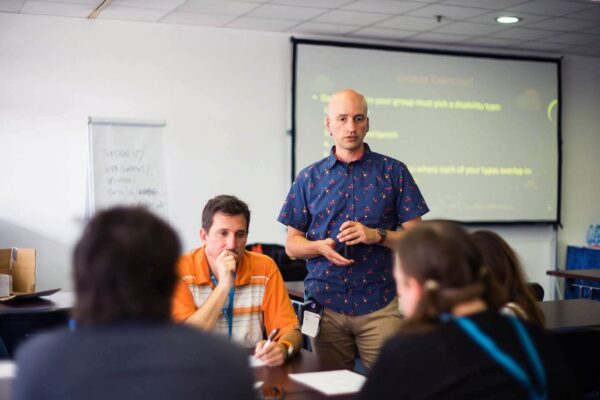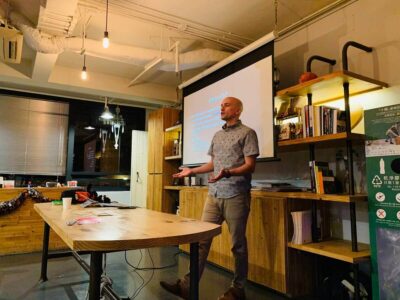Article updated
This article has been updated since it was first published on July 11, 2023. The most recent update was added on January 29, 2024. Read the updates for this article.

This is an article about a lawsuit filed by AudioEye, a multi-million dollar accessibility company, against Adrian Roselli, a long-time leader in the global digital accessibility community. Adrian has been a vocal critic, as have I, against one-line of code software that claims to make websites accessible.
AudioEye sells (licenses) an overlay. The company has sued Adrian to stop him from expressing his opinions about the Audio Eye overlay product.
It is an opinion shared and documented by many.
Adrian and I are two of 785 people from around the world who, as of today, have signed the Overlay Statement found in the Overlay Factsheet. Please read the Fact Sheet if you are not familiar with this civil rights issue.
Jump to:
I believe AudioEye has filed a SLAPP suit – what’s that?
In my opinion this lawsuit is a classic example of a type of lawsuit known as a SLAPP suit. The abbreviation stands for “Strategic Lawsuit Against Public Participation.” It is a type of lawsuit that targets activists in a number of fields around the globe. See, eg. SLAPPs in Latin America: Strategic lawsuits against public participation in the context of business and human rights.
Another article is SLAPPed but not silenced: Defending human rights in the face of legal risks. This resource contains a global database of “cases that bear the hallmarks of SLAPPs” around the world.”
Adrian has been a leader in a global effort to educate website owners about the limitations and harms of overlays to disabled people. And a global leader in sharing accessibility information generally. The image at the top of this post is of Adrian leading an accessibility workshop in Serbia. Elsewhere in this article is an image of Adrian speaking at an accessibility event in Hong Kong.
Instead of embracing Adrian Roselli’s expertise to better its product, Audio Eye, in my opinion, has strategically singled out a top leader in this space for his participation in this urgent conversation.
The sound of the SLAPP abbreviation is appropriate. A SLAPP suit is a slap in the face of the person being sued for participating in a public issue. And it is a threatened slap in the face for everyone else participating publicly in that issue.
Things that do not explain why I’m publicizing this lawsuit
Here are some disclosures:
- The lawsuit against Adrian mentions me in two places. Paragraph 27 of the complaint says:
Upon information and belief, this article served as the basis for false, tortious statements made on the website of Lainey Feingold, a disability rights lawyer in California.Complaint in AudioEye vs. Adrian Roselli (link below)
A “tort” is a wrongful act or an infringement of a right leading to civil legal liability. In this paragraph AudioEye is saying that an article I wrote about an accessibility settlement with ADP (in which I praise the company and the blind consumers for using Structured Negotiation to resolve the claims after the lawsuit was filed), infringes someone’s rights, presumably AudioEye’s.
It also accuses me of making false statements on this website.
The second reference to me in the lawsuit against Adrian is in Paragraph 37. It is also about my ADP article, in which I link to and quote from the settlement reached between software giant ADP and blind people who couldn’t use certain ADP workplace software. The complaint states that “Contrary to Roselli’s statements (and similar statements by Lainey Feingold), the ADP Settlement does not ban ADP TotalSource, Inc. (“ADP”) from using AudioEye.”
But these insults and veiled threats against my writing (and against me) are not the reason I am writing this article.
- Adrian is a friend of mine, someone I met and connected with through the digital accessibility community. It is a connection strengthened by attending, speaking at, and sponsoring the same conferences, concerned with the same issues. I put the word accessibility “industry” in quotes in the title of this article because while accessibility has indeed become an industry, it has long been and still is a community. A community that both Adrian and I are part of.
But our friendship is not why I’m publicizing this lawsuit.
- Adrian inspired me to write one of the most popular articles on this website — My 2022 piece titled Hitchhiker’s Guide to Global Accessibility Awareness Day. You can read about Adrian’s role in the first paragraph.
But that’s not why I’m posting this article either.
Why I AM writing this article
Digital accessibility is a civil right. It is the bridge that connects people with disabilities to the technology and content of the digital world. Without accessibility disabled people are excluded. With accessibility the promise of disability inclusion is made possible.
This lawsuit against Adrian Roselli impacts every person who cares about including disabled people in the digital world. It impacts all of us who speak, write, and advocate for digital accessibility that is fair, equitable, and ethical.
 The lawsuit has what is known as a “chilling effect” (thus the image of ice cubes). I have personally experienced it, and I know others who have too. Who will be next? What type of conversation is off limits?
The lawsuit has what is known as a “chilling effect” (thus the image of ice cubes). I have personally experienced it, and I know others who have too. Who will be next? What type of conversation is off limits?
AudioEye is not the only company selling an overlay product that has filed this type of lawsuit against an accessibility advocate. My 2021 article Legal Update: Accessibility Overlay Edition, has a section titled French Overlay Company Sues Advocates for Their Role in the Global Overlay Conversation.
In it I talk about two lawsuits filed by a French company called FACIL’iti that sued two French advocates in the French version of a SLAPP suit called poursuites bâillons” (literally “gagging pursuits”). Those cases continue.
The global effort to “gag” respected advocates must be stopped.
This AudioEye lawsuit that seeks to silence a well respected accessibility advocate also impacts potential customers of overlay companies who deserve accurate information about the product they are considering.
It is my belief that the vast majority of organizations (public, private, and non-profit sector) who are buying overlay products want to do what’s best for their customers with disabilities. Many overlay companies are well-funded by venture money. A lot of that money is poured into advertising the products. Potential buyers deserve information from people like Adrian Roselli.
Most significantly, this type of lawsuit hurts people with disabilities. People harmed by overlay products that can create barriers for some disabled people while failing to deliver accessibility as promised for others. People directly impacted when organizations chose a quick fix short-cut instead of baking disability inclusion into their technologies and content.
It is for these reasons that I’m publicizing this case.
I urge AudioEye, whose business does more than license overlay software, to drop this lawsuit. The AudioEye Board of Directors includes Tony Coelho, a primary author and sponsor of the Americans with Disabilities Act (ADA) and a longtime champion of people with disabilities. I urge the Board to reconsider this lawsuit strategy.
AudioEye is represented in this case by Akin Gump Strauss Hauer & Feld LLP (Akin), one of the world’s largest law firms with 900 lawyers in 20 offices around the globe. Its website states that the firm has a culture rooted in collaboration and caring. I also urge this reputable firm to consider the harms caused by this type of litigation that stifles public discourse on a global civil rights issue.
Documents Related to AudioEye’s case against Adrian Roselli
 You can read the Complaint in the lawsuit filed against Adrian, and the documents Adrian and his lawyers have filed in court, on his website. They are linked in an article there titled “AudioEye is Suing Me.”
You can read the Complaint in the lawsuit filed against Adrian, and the documents Adrian and his lawyers have filed in court, on his website. They are linked in an article there titled “AudioEye is Suing Me.”
On his site, as of the date I’m publishing this article, the most recent documents are related to the July 6, 2023 Motion to Dismiss the case filed by Adrian’s lawyers. These documents include a 34 page legal analysis that starts with this sentence:
This case is a classic strategic lawsuit against public participation, or “SLAPP.” AudioEye, Inc., a massive corporation, has picked out and sued an individual critic explicitly to chill future speechDefendant’s Memorandum Of Law In Support Of His Motion For Anti-SLAPP Dismissal And Summary Judgment
The legal papers filed by Adrian’s lawyers also include statements (officially called affidavits and affirmations) from Adrian and other advocates within and outside the United States. These statements, available here, support Adrian’s stated opinion about AudioEye and push back on the idea of a company filing a lawsuit because they don’t like or agree with that opinion.
I think the statement of well-respected British accessibility expert Léonie Watson, a blind person and Director of the accessibility consultancy TetraLogical reflects a sentiment shared by many of us in the global accessibility community.
First Léonie explains that she “agreed with Adrian that “AudioEye’s overlays do not work as advertised. I hold this opinion having verified many of Mr. Roselli’s findings for myself, knowing that he, like all good investigative researchers, shares his results for scrutiny and validation by other members of the accessibility profession.”
Then she said:
Finally, I want to express my disgust at the very idea of an organisation suing an individual who has pointed out flaws in their product that, had they listened and acted, could have meant their product was much improved. The security industry has matured to the point where researchers that identify vulnerabilities in products and services are awarded bounties, not threatened with legal action. One can therefore only speculate why AudioEye has chosen to sue Mr. Roselli instead of responding positively to the feedback Mr. Roselli offered. Léonie Watson affidavit in AudioEye vs. Adrian Roselli
I’m an optimist. It’s never too late to change course. I hope AudioEye and its lawyers do and drop this case.
Updates to this article
January 29, 2024 Update
Excellent news came on January 3, 2024 when I learned that AudioEye dropped its lawsuit against accessibility expert and advocate Adrian Roselli discussed above. Adrian explains it all in his article titled “AudioEye Has Dropped Its Suit Against Me.” I encourage you to read it.
There are two lawsuits still pending against well-respected accessibility advocates who have opinions critical of one-line-of-code overlays. They have been filed in France by the global overlay company FACIL’iti. One is against a small woman-owned accessibility firm (Koena, owned by Armony Altinier). The other is against a solo accessibility consultant with disabilities (Julie Moynat). You can read about these suits in my article and its updates titled Legal Update, Accessibility Overlay Edition.
SLAPP suits (Strategic Lawsuits Against Public Participation) against participants in the global overlay conversation must stop. Congratulations to Adrian Roselli and his lawyers for the positive ending to this one. Rooting for a swift and positive conclusion to the French lawsuits too.